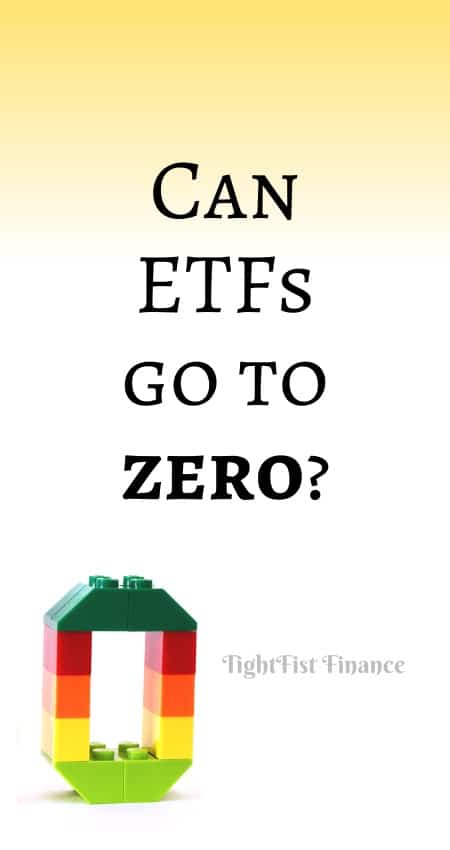Can ETFs go to zero?
All investments, including ETFs, have investment risk including complete loss of investment. However, it is unlikely an exchange traded fund would go to zero. Leveraged ETFs are considered riskier investments and have a greater chance of going to zero.
Imagine, investing with confidence and knowing the chances of your ETF disappearing are slim to none. You’re actually making money in the stock market!
ETF investing is great for buy and hold investing.
Luckily for you, I’m going to help explain the chances of an ETF going to zero. I’ll even show you why leveraged ETFs are considered riskier and what stock market protections are in place.

This article may contain affiliate links which provide a commission and support this blog. Thank you for your support!
Can ETFs go to zero?
All investments have risks, including complete loss of investments. However, normal exchange traded funds have a small chance because of the level of diversification. However, leveraged ETFs borrow money to amplify gains or losses, making them riskier.
The riskier the investment, the bigger the chance of investment losses. Exchange traded funds have multiple stock holdings, which makes them a diverse asset.
However, there are many types of exchange traded funds. Each type of ETF has their own risk factors to consider.
ETFs that track the S&P 500 are often considered a safe investment. The S&P 500 has been around since 1957 and has a long track history of succeeding.
However, leveraged ETFs have a higher likelihood of going to zero. Leveraged exchange traded funds borrow money to increase gains or losses.
For example, UPRO is a 3x S&P 500 leveraged ETF. Should the S&P 500 go up 5% in one day, UPRO would go up 15%. Should the S&P 500 fall by 33% in one day, UPRO would go to zero.
However, the furthest the S&P 500 has fallen in one day is 20.47%. Since then, the stock market has implemented market halts or circuit breakers. These halts stop trading at drops of 7%, 13% and 20%. At 20%, trading is halted for the day.
Therefore, it is unlikely that even a triple leveraged ETF like UPRO would go to zero.
Click to Tweet! Please Share!Click To TweetWhat happens if an ETF goes bust?
ETFs that go bust will follow a liquidation process and investors should be notified of liquidation. Investors will be given the option to sell shares at the current price, creating a taxable event. The ETF will no longer be tradeable and removed from market listing.
Are ETFs safe to invest in?
All investments have risk, but most exchange traded funds are considered to be a safe investment. ETFs are typically safer than individual stocks, because of the level of diversification. However, each ETF has different underlying goals so it’s important to understand the risk factors involved.
The biggest risk of ETF investing is not understanding your investments. Investors need to understand the investment fees, fund goals, and liquidity. Simply knowing what you’re doing can prevent a lot of costly mistakes.
Each fund has an associated fee. You could buy an S&P 500 index fund that cost you 0.03% per year or the same fund from a different brokerage at 1% per year. The funds both track the S&P 500, but one just costs more.
What are the goals of the fund? Are you investing in one asset class like real estate? Or is your fund a broad and diverse investment like the S&P 500?
You also need to understand that not every fund has high liquidity. Liquidity is the ability to sell your investments at a moment’s notice. Some ETFs may take a while before you can get your money after selling.
For the most part, exchange traded funds are considered a safe investment. ETFs allow investors to buy and hold with minimal thought. The investments are typically well diversified, making them safer than individual stocks.
Click to Tweet! Please Share!Click To TweetSummary: Can ETFs go to zero?
As you can see, ETFs do have the potential to go to zero. However, having an exchange traded fund go to zero is unlikely.
Normal ETFs, like the S&P 500, have been around for years. The S&P 500 is seen by many investment professionals as a safe investment. However, not all ETFs are created the same.
Leveraged ETFs are riskier because they borrow money to enhance gains or losses. A triple leveraged ETF falling 33% in one day could go to zero. However, it is unlikely because the market has circuit breakers to halt trading at certain increments.
Should an ETF go bust, the fund managers will follow a liquidation process. You’ll be informed of the funds closing and be able to sell your shares. The fund will be removed from the stock market listing. Unfortunately, liquidation events can be taxable.